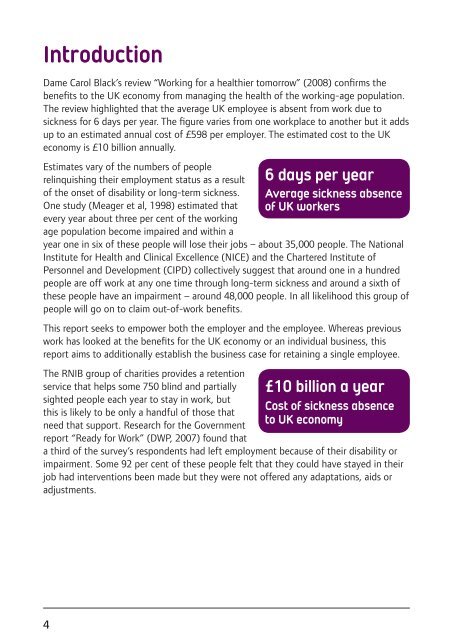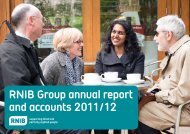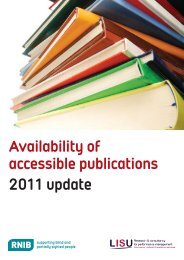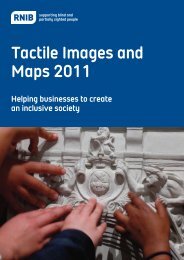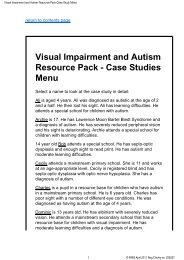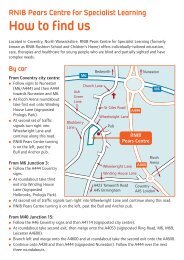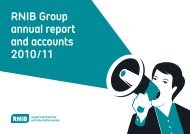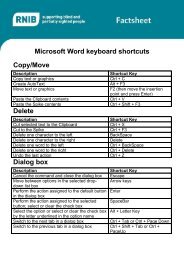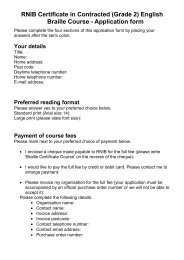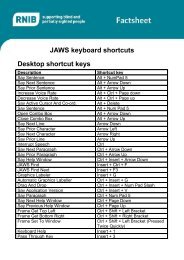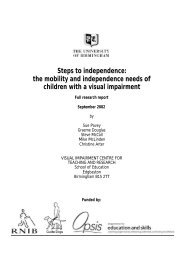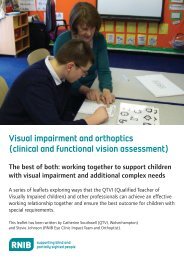Vocational rehabilitation: The business case for retaining ... - RNIB
Vocational rehabilitation: The business case for retaining ... - RNIB
Vocational rehabilitation: The business case for retaining ... - RNIB
Create successful ePaper yourself
Turn your PDF publications into a flip-book with our unique Google optimized e-Paper software.
Introduction<br />
Dame Carol Black’s review “Working <strong>for</strong> a healthier tomorrow” (2008) confirms the<br />
benefits to the UK economy from managing the health of the working-age population.<br />
<strong>The</strong> review highlighted that the average UK employee is absent from work due to<br />
sickness <strong>for</strong> 6 days per year. <strong>The</strong> figure varies from one workplace to another but it adds<br />
up to an estimated annual cost of £598 per employer. <strong>The</strong> estimated cost to the UK<br />
economy is £10 billion annually.<br />
Estimates vary of the numbers of people<br />
relinquishing their employment status as a result<br />
of the onset of disability or long-term sickness.<br />
One study (Meager et al, 1998) estimated that<br />
every year about three per cent of the working<br />
age population become impaired and within a<br />
year one in six of these people will lose their jobs – about 35,000 people. <strong>The</strong> National<br />
Institute <strong>for</strong> Health and Clinical Excellence (NICE) and the Chartered Institute of<br />
Personnel and Development (CIPD) collectively suggest that around one in a hundred<br />
people are off work at any one time through long-term sickness and around a sixth of<br />
these people have an impairment – around 48,000 people. In all likelihood this group of<br />
people will go on to claim out-of-work benefits.<br />
This report seeks to empower both the employer and the employee. Whereas previous<br />
work has looked at the benefits <strong>for</strong> the UK economy or an individual <strong>business</strong>, this<br />
report aims to additionally establish the <strong>business</strong> <strong>case</strong> <strong>for</strong> <strong>retaining</strong> a single employee.<br />
<strong>The</strong> <strong>RNIB</strong> group of charities provides a retention<br />
service that helps some 750 blind and partially<br />
sighted people each year to stay in work, but<br />
this is likely to be only a handful of those that<br />
need that support. Research <strong>for</strong> the Government<br />
report “Ready <strong>for</strong> Work” (DWP, 2007) found that<br />
6 days per year<br />
Average sickness absence<br />
of UK workers<br />
£10 billion a year<br />
Cost of sickness absence<br />
to UK economy<br />
a third of the survey’s respondents had left employment because of their disability or<br />
impairment. Some 92 per cent of these people felt that they could have stayed in their<br />
job had interventions been made but they were not offered any adaptations, aids or<br />
adjustments.<br />
4


